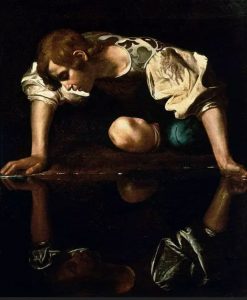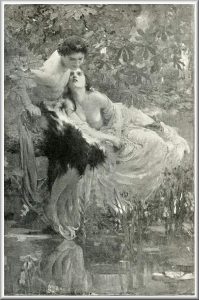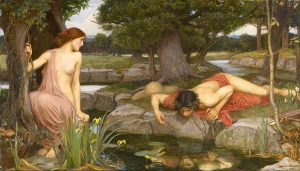Many know the rough  outlines of the original myth of Narcissus, the man who was so enamoured with his own image that he drowned while reaching for his reflection in a pool. The original outlines of the myth are more complex.
outlines of the original myth of Narcissus, the man who was so enamoured with his own image that he drowned while reaching for his reflection in a pool. The original outlines of the myth are more complex.
A son of gods, Narcissus was doomed from the start. He not only was gifted with extreme beauty, but had the overweening sense of his own self-worth that we come to associate with narcissism. His mother Liriope was told by the seer Tiresias at birth that Narcissus would live a long life if he never discovered himself. Kept from mirrors, Narcissus never had a chance to fall in love with his own image.
Instead, looking for love in the  mirror of the other, he rejected all lovers who approached him, even Echo, who was cursed to repeat back to the sender any message she received. Thus, if Narcissus were to claim that he loved her, Echo would have said the same, thus giving someone with such an overinflated sense of self the gratification their fragile self-esteem desired. Narcissus rejected Echo’s advances, and left her to pine away in a lonely glade, and her voice faded without someone to imitate until she disappeared entirely.
mirror of the other, he rejected all lovers who approached him, even Echo, who was cursed to repeat back to the sender any message she received. Thus, if Narcissus were to claim that he loved her, Echo would have said the same, thus giving someone with such an overinflated sense of self the gratification their fragile self-esteem desired. Narcissus rejected Echo’s advances, and left her to pine away in a lonely glade, and her voice faded without someone to imitate until she disappeared entirely.
Even for the gods, Narcissus’ way of treating the innocent Echo was interpreted to be excessively  cruel, and Nemesis determined to exact a suitable revenge. She led Narcissus far into the forest until he was thirsty and then showed him a still pool. Narcissus bent to drink, and there, entranced by his own reflection, he fell in love.
cruel, and Nemesis determined to exact a suitable revenge. She led Narcissus far into the forest until he was thirsty and then showed him a still pool. Narcissus bent to drink, and there, entranced by his own reflection, he fell in love.
Unfortunately the ripples in the pool disturbed his attempts to embrace himself, and the closer he came to touching himself the farther he receded from view. Finally, in agony because he could not close with the one he loved, he, depending on the version, fell in and drowned, killed himself, or pined away from unrequited love much like Echo had done.
Anyone hearing the story now will both recall people they have known who are obsessed with their  appearance, with the selfies on social media and the dependence on accolades to prove it. As well, they will lament that Narcissus didn’t merely have a mirror. Then he could stand in front of it all day, proclaiming his self-love like too many who end up becoming celebrities and business leaders and politicians, standing before the social mirror of adoring fans and followers.
appearance, with the selfies on social media and the dependence on accolades to prove it. As well, they will lament that Narcissus didn’t merely have a mirror. Then he could stand in front of it all day, proclaiming his self-love like too many who end up becoming celebrities and business leaders and politicians, standing before the social mirror of adoring fans and followers.
The useful portion of the narcissus myth has more to do with the destructive nature of self-love than they do the exact mechanism by which someone might fulfill their  desire for self, however. The lesson of Narcissus is lost on few as they contemplate that Narcissus could have enjoyed a pleasant life but for the extreme selfishness of his desires. The myth teaches that such an obsession with the self, the inability to look outside the self and consider others as equals or, in extreme cases, even worthy of notice, ultimately leads to destruction.
desire for self, however. The lesson of Narcissus is lost on few as they contemplate that Narcissus could have enjoyed a pleasant life but for the extreme selfishness of his desires. The myth teaches that such an obsession with the self, the inability to look outside the self and consider others as equals or, in extreme cases, even worthy of notice, ultimately leads to destruction.
